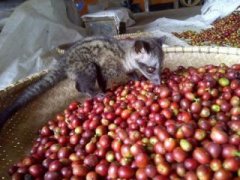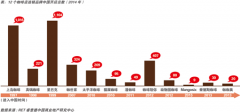The Truth of Fair Trade in a Cup of Coffee
Fair Trade is a social movement launched by developed countries to provide fairer terms of trade through a number of international aid organizations to protect the rights and interests of workers and producers in poor countries. Some economists believe that "fair trade" is essentially a form of subsidy, which hinders economic development and cannot eradicate the problem of poverty.
Recently, Bruce Wydick, a professor of economics and international studies at the University of San Francisco, wrote that through a long-term study of Coffee, the leading "fair trade" project in the world, combined with the research results of other American economists, it has been found that the implementation of the Coffee program has had little positive impact on the poorest farmers. He questioned that the construction of the "fair trade" system was not mature.
Did not bring the desired effect to the poorest.
In an interview with our reporter, Widdick said that he had done a lot of research on poverty alleviation projects for a long time. He believes that Fairtrade's Coffee project has not achieved the desired results.
According to Widdick, African coffee growers who work with Fairtrade in the United States can receive a salary of about $1.4 an hour, but only if they spend money on certification qualifications every year. And comply with conditions such as restrictions on the use of pesticides and chemical fertilizers. As a result, growers' profits from joining Fairtrade are basically spent on buying qualified and higher standards of pesticides and fertilizers, and their returns are zero in the long run. In this regard, Widdick believes that these conditions should be borne by the institutions implementing "fair trade" rather than passed on to growers.
Widdick said that globally, middle-income countries such as Mexico, Brazil and Colombia have achieved the greatest success through Fairtrade Coffee, while Africa's poorest coffee growers, such as Ethiopia, Kenya and Tanzania, have not achieved the desired results. Even in African growers, it is coffee growers who are relatively financially well-off and technologically mature, rather than low-level manual workers, who have increased their incomes through "fair trade".
In response, Widdick asked, shouldn't effective anti-poverty interventions give priority to the poorest areas and the poorest people?
Lack of transparency in capital spending
Widdick conducted an opinion poll in San Francisco and found that many coffee consumers are willing to pay at least 50 cents per cup for "Fairtrade coffee", which they think will help poor coffee growers.
However, Widdick believes that this is "Fairtrade" agencies through the public relations strategy to mislead consumers. He said there was a lack of third parties to evaluate the effectiveness of Fairtrade's implementation. How Fairtrade's money is spent is not transparent. For example, scholars at California State University have found that a lot of money is spent on office construction and staff salaries at Coffee partner institutions, rather than improving conditions in poor areas.
Does not conform to the law of economic operation
In addition, according to Widdick's analysis, in terms of the quality of coffee beans themselves, if the market price of low-quality coffee beans is less than US $1.4 and that of high-quality coffee beans is higher than US $1.40, then the result of "Fairtrade" operation is to stimulate growers to sell low-quality coffee beans to "Fairtrade" channels. After the coffee beans enter the "fair trade" market, buyers will be worried about the poor quality of the coffee beans bought through the system and are reluctant to buy any more.
As a result, Widdick believes that while direct trading is not a perfect form, it is more effective and sustainable than "fair trade". In direct trade, coffee bean buyers directly use high prices to buy high-quality coffee beans, which is more in line with the law of economic operation. In addition, the current "fair trade" model continues to encourage coffee growers to plant more coffee beans, and the more they plant, the greater the supply of coffee beans and the lower the price.
Widdick stressed that Fairtrade's Coffee program did not address the root causes of poverty. His new book, the Taste of the Mountains (The Taste of Many Mountains), about Guatemalan coffee growers and Fairtrade coffee, based on his research experience, has been published. He hopes that readers will have a better understanding of the process of Fairtrade Coffee and what is a more effective form of international aid.
Important Notice :
前街咖啡 FrontStreet Coffee has moved to new addredd:
FrontStreet Coffee Address: 315,Donghua East Road,GuangZhou
Tel:020 38364473
- Prev

Reveal the secret that the top Kopi Luwak civet only chooses good beans to eat.
The civet first helps people pick out coffee beans, and the roasted coffee is sweet in the mouth, leaving fragrance in the lips and teeth. Docile civets do not eat all coffee beans. They choose the most ripe, sweet, juicy coffee fruits as food. According to the Central News Agency, one of the main producers of civet coffee, known as the world's most expensive coffee, is Indonesia, while it is found in Europe and the United States.
- Next

Research report on the Development trend of Korean Coffee shops in China
In the traditional impression, the European and American coffee shop brand Starbucks has been the "coffee shop scenery" in major cities for a long time, but in recent years, similar to popular film and television dramas, fashion clothing and other fields, there has also been a "Korean wave" in the coffee shop field.
Related
- Workers collapse! Lucky suspects that it will introduce freshly cut fruits?!
- 1-point subsidy recipients wear thousand-yuan watches?! Local response: For low-income households
- Can lightly roasted coffee beans be used to extract espresso? How finely should you grind high-quality coffee beans to make Italian latte?
- What is the difference between the world's top rose summer coffee and Yejia Shefi? What are the flavor characteristics of Yega Shefi coffee and Panama rose summer?
- The ceremony is full! Starbucks starts to cut the ribbon at a complimentary coffee station?!
- A whole Michelin meal?! Lucky launches the new "Small Butter Apple Crispy Latte"
- Three tips for adjusting espresso on rainy days! Quickly find the right water temperature, powder, and grinding ratio for espresso!
- How much hot water does it take to brew hanging ear coffee? How does it taste best? Can hot water from the water dispenser be used to make ear drip coffee?
- What grade does Jamaica Blue Mountain No. 1 coffee belong to and how to drink it better? What is the highest grade of Blue Mountain coffee for coffee aristocrats?
- What are the flavor characteristics of the world-famous coffee Blue Mountain No. 1 Golden Mantelin? What are the characteristics of deep-roasted bitter coffee?

